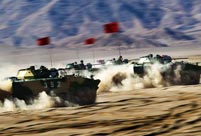 Cockfighting show staged in E. China's Heze during Spring Festival
Cockfighting show staged in E. China's Heze during Spring Festival
 Chinese New Year Flower Fair opens in San Francisco
Chinese New Year Flower Fair opens in San Francisco
 Festivities in Shanghai
Festivities in Shanghai
 PLA navy conducts drill in North China Sea
PLA navy conducts drill in North China Sea
 World's high-tech hotels
World's high-tech hotels
 Li Na poses with trophy on Brighton Beach in Melbourne
Li Na poses with trophy on Brighton Beach in Melbourne
 Six Chinese divers back safely after 300-meter saturation dive
Six Chinese divers back safely after 300-meter saturation dive
 Traditional wedding ceremony of Yao people
Traditional wedding ceremony of Yao people
 Taipei Game Show attracts geeky gamers
Taipei Game Show attracts geeky gamers
 |
| Illustration: Liu Rui/GT |
"We certainly do not want to see a coup or violence," said US State Department spokesperson Jen Psaki in Washington on Monday responding to journalists' questions.
"We are speaking directly to all elements of Thai society to make clear the importance of using democratic and constitutional means to resolve political differences," she said.
The stance of the US may be one important reason for why a coup still hasn't taken place in Thailand. Even in today's Asia, where the economic pattern keeps changing, the US' political influence on Southeast Asian countries can never be underestimated.
In 2006, then prime minister Thaksin Shinawatra was deposed in a military coup. The US declared itself "disappointed" in the coup, though with a rather weak tone. Some lawmakers believed that Washington's moves only showed it had given up support for an orderly democracy in Thailand.
Prior to the country's 2011 elections, some US lawmakers proposed that given Thaksin's sister Yingluck was likely to win, the US government should request that the monarchy and the military accept the result and not interfere in the democratic process.
The US' latest statements about the current situation in Thailand reflect Washington's focus in its pivot to Asia strategy, which aims to expand its "flag effect" through supporting the democratic process of Asian countries. Indeed, the US' moves have helped it win the hearts of people in Southeast Asia.
So far, the political chaos in Thailand has lasted for more than three months. Rumors of a military coup have been spreading. These rumors have not turned into reality, showing the growing strength of public opposition to a military coup.
Compared to the US, the interests of China may be more pertinent to the evolution of Thailand's politics. However, so far, China's stance has remained balanced, as it always is.
China can stick to its principles as it has done in dealing with past similar affairs and encourage the opposing sides to walk out of the deadlock through political means. Nonetheless, it can be clearer in its objection to a military coup.
This has nothing to do with following the example of the US. Rather, such a declaration will suit the overall interests of China and the whole of Asia. A military coup will not bring real democracy. Facts have already shown that a coup will only result in a disrupted democratic process and growing discrepancies between opposing sides.
Thailand is a core country of ASEAN. The stability of Thailand affects that of the whole of Southeast Asia. The current period is a time of economic integration of ASEAN. The political turbulence in Thailand will likely drag out this process, thus having a negative impact on the economic development of the entire region.
Thailand also plays a coordinating role in China's relations with ASEAN. China is at an important stage of upgrading the free trade zone with ASEAN. Therefore, maintaining stability in Thailand is vital to China's interests.
There is the possibility that a military coup takes place in Thailand. Even if it does become a reality, the relationship between China and Thailand will not be affected due to China's stance. We should be confident about that.
Real friends not only share plights, but also point out the right way when the other is mired in trouble.
Since 1932, when Thailand established its constitutional monarchy, the country has followed a troubled democratic process of over 80 years, but it has never rid itself of the vicious circle of military coups.
No one expects the sharp contradictions among Thailand's different interest groups to be eliminated in a short period, but as long as the achievements of democracy are not undone by undemocratic means, this is already a great step forward.
Most of China's neighboring countries are in a phase of political transition. How to strengthen ties with these countries when their democratic process is experiencing fluctuations is the main test for China's relations with them in the future. China, as a major regional power, should encourage Thailand's opposing sides to achieve reconciliation, promote institutional improvement and establish foundations for good governance through the will of the Thai people and political means.
The author is a senior editor with People's Daily. He is now stationed in Brazil.
 3D film 'The Monkey King' premieres in Beijing
3D film 'The Monkey King' premieres in Beijing  Miss Chinese Int'l Pageant 2014 held in Hong Kong
Miss Chinese Int'l Pageant 2014 held in Hong Kong 'Golden Flowers' in the Spring Festival travel rush
'Golden Flowers' in the Spring Festival travel rush Li Na beats Cibulkova to win Australian Open
Li Na beats Cibulkova to win Australian Open Sexy models at Taipei Game Show 2014
Sexy models at Taipei Game Show 2014 'Living in ice house' competition held in central China
'Living in ice house' competition held in central China  Highlights of Chinese airborne troops'exercises
Highlights of Chinese airborne troops'exercises  All-male high speed train crew during Spring Festival travel rush
All-male high speed train crew during Spring Festival travel rush PLA navy drills in East China Sea
PLA navy drills in East China Sea President Xi visits border troops ahead of Lunar New Year
President Xi visits border troops ahead of Lunar New Year What do Chinese pack in their luggage in Spring Festival Rush?
What do Chinese pack in their luggage in Spring Festival Rush? Blind date fair in Hangzhou of Zhejiang province
Blind date fair in Hangzhou of Zhejiang province Film 'Where Are We Going, Dad' premiered in Beijing
Film 'Where Are We Going, Dad' premiered in Beijing  Australian Open champion Li Na returns to hometown Wuhan
Australian Open champion Li Na returns to hometown Wuhan Twin sisters serve during Spring Festival travel rush for the first time
Twin sisters serve during Spring Festival travel rush for the first timeDay|Week|Month